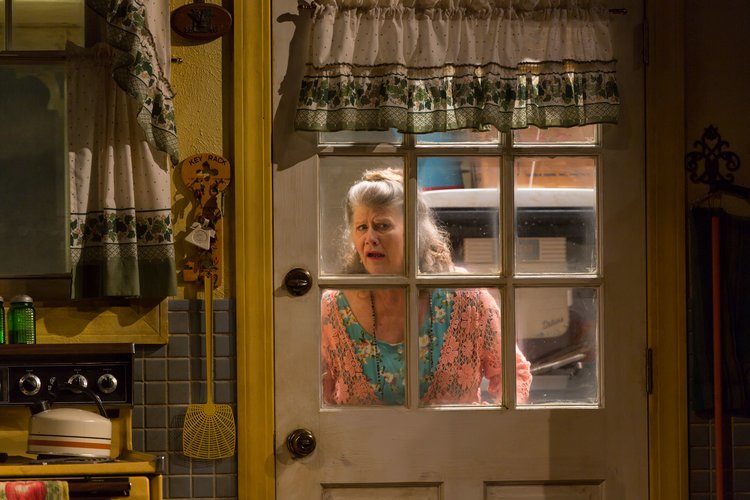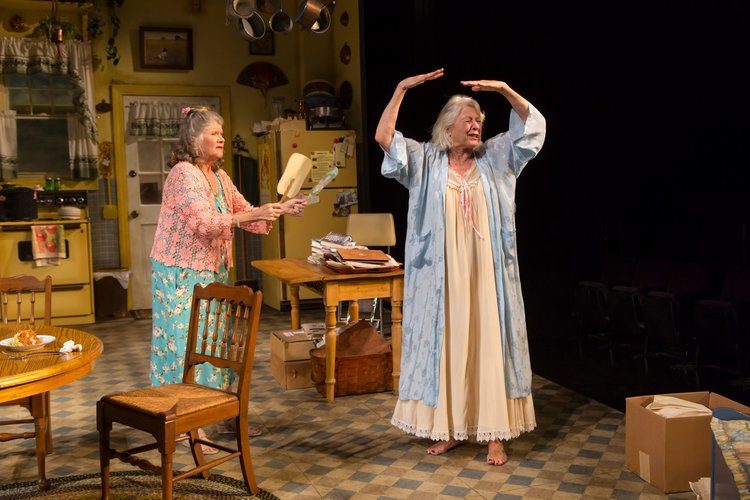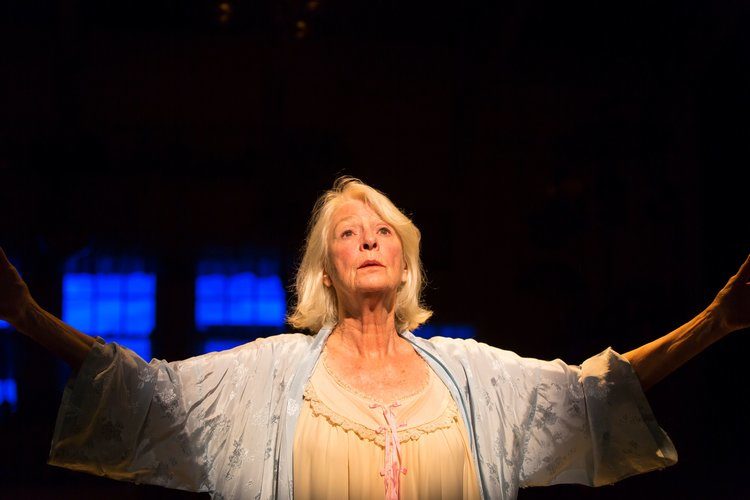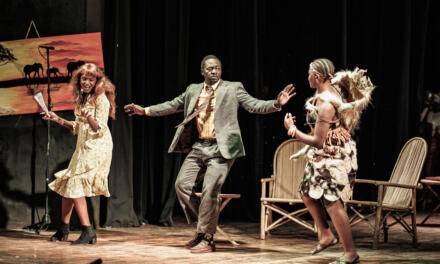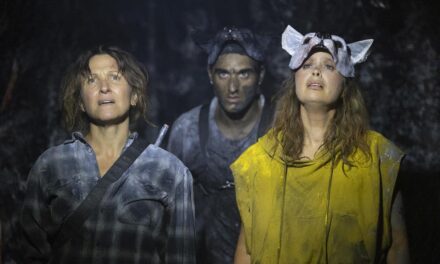The kitchen of an aging spinster in a small town in Texas may be an unlikely place to find romance, and that’s the challenge of Fireflies, Matthew Barber’s adaptation of a novel by Annette Sanford, now playing at the Long Wharf Theatre. The school-marm, the nosey neighbor, the drifter / hired man are figures almost archetypal in their familiarity, and in their evocation of a certain kind of nostalgic Americana. To instill such types with believable, three-dimensional reality is not easy, but that’s what a trio of top-flight actors does with these roles, directed by Gordon Edelstein.
Jane Alexander, a superlative character-actor her entire career, makes Eleanor Bannister, a retired school-teacher, a study in impulse at war with set-in-her-ways certainty. Eleanor spends all her time in her expansive kitchen in a house built by her daddy in a town with a population under 2,000. Alexander Dodge’s homey set has the character of a place and style that suits the folks who live there. Its appliances all look lived with and serviceable and definitely not “remodeled”—a word that would probably seem a neologism to Eleanor’s fine—and fussy—sense of correct English.
Eleanor is a taciturn woman who likes to keep to herself. Her busy-body neighbor Grace Bodell (Judith Ivey, pitch-perfect) is always dropitch-perfectorrow something and to dispense reminders and warnings. The latest involves a mysterious “drifter” who has hit town, going around—as Grace sees it—looking for soft-touch elderly ladies living alone to bilk of anything they’ve got.
Judith Ivey, a favorite with Long Wharf audiences, plays Grace with a wonderfully sympathetic grasp of how seemingly oblivious the lady is to Eleanor’s weariness with her intrusiveness and unwanted advice. She knows Eleanor isn’t the gossipy sort, but she’s got to try. She’s the very epitome of the phrase “means well,” and anyone who comes beneath her care—as her solitary neighbor does, perforce—will be a recipient of endless nuggets of local news, queries, and remarks full of outright incredulity at the slightest departure from custom and good sense. In effect, this is Grace’s lucky day because Eleanor is departing from both with an almost reckless abandon.
Almost. And that’s the great charm of Barber’s simple tale. The way Alexander’s Eleanor moves with a spirit she never really knew, then reins it in again with doubts and suspicions and, characteristically, a tendency to think she knows better than anyone. It’s that conviction that keeps coming under scrutiny as she wonders if there might be a bit more to life than she’s already known. An idea that gets met with panic or is the product of panic.
The titular fireflies get invoked a few times, not least in a brief dream sequence that feels steeped in a bit of hoary Our Town-style modernism (Edelstein directed a fine revamp of that familiar American theater chestnut a few years back). Eleanor, in Alexander’s portrayal, is the real firefly, winking on and off in response to the one thing this town rarely sees: a stranger.
As Abel Brown, the stranger, Denis Arndt is ingratiating and obliging. In the show’s first Act, he seems genuine enough, deliberately not living up to what the wagging tongues would make of him. His interest in Eleanor’s “honeymoon cottage” may be self-serving or it may be at her service, and that’s the question. In the shorter second Act, Arndt’s Brown really comes into his own, driven to exposition by the fact that he has been compromised. He gives a nicely calibrated aria of admission from a man who never willingly explains himself. His aggrieved sense of why he’s being driven to such ends—that he is in fact in a love story—lands with a fine sense of how some things must be so because they are.
Fireflies is not cutting edge theater and it’s not out to set the world on fire. It works the complacent rhythms of romantic comedy quite well and lets our familiarity with small-town drama provide a context that could be more sinister. Barber shrewdly builds in a little suspense by having an intermission provoke guesses about where we’ll wind up. As the second Act opens, the presence of a police officer—a former pupil of Eleanor’s—makes us wonder about the interim. He also provides some background detail that a Google search might turn up, these days. As Officer Claymire, Christopher Michael McFarland adds a touch more comedy to the proceedings, accounting himself well as a local authority presiding over the authority that once stifled him as child. His impromptu partial recital of a poem Miss Bannister taught him—Coleridge’s rhythmic wonder “Kubla Kahn”—says it all.
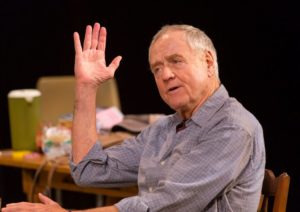
Photo: T. Charles Erickson
It may be that Fireflies is a passing glimpse of a manner of theater that is dying off, as insects do when the season is over. Yet in showing how actors can make even simple characters compelling, the play provides more sparks of greatness than some other, more contemporary-sounding romances I might name. At least I cared whether or not these two would make up, and the fact that Alexander and Arndt argue like a seasoned couple helps sell the point that they both, indeed, have some skin in the game. Which might be a way of saying that people who have had to face up to a load of things they’ll never do are more likely to be stirred by this last chance Texaco romance.
Thematically, the play made me recall a little gem from the pen of Leonard Cohen: “It’s just that I thought a lover / Had to be some kind of liar too.”
Fireflies
By Matthew Barber
From the novel Eleanor & Abel by Annette Sanford
Directed by Gordon Edelstein
Set Design: Alexander Dodge; Costume Design: Jess Goldstein; Lighting Design: Philip Rosenberg; Sound Design: John Gromada; Production Stage Manager: Kathy Snyder, Mary Spadoni; Assistant Stage Manager: Amy Patricia Stern, Michelle Lauren Tuite; Casting: Calleri Casting
Cast: Jane Alexander, Denis Arndt, Judith Ivey, Christopher Michael McFarland
Long Wharf Theatre
October 11-November 5, 2017
This post was originally published in the New Haven Review on October 25, 2017 and has been reposted with permission.
This post was written by the author in their personal capacity.The opinions expressed in this article are the author’s own and do not reflect the view of The Theatre Times, their staff or collaborators.
This post was written by Donald Brown.
The views expressed here belong to the author and do not necessarily reflect our views and opinions.

